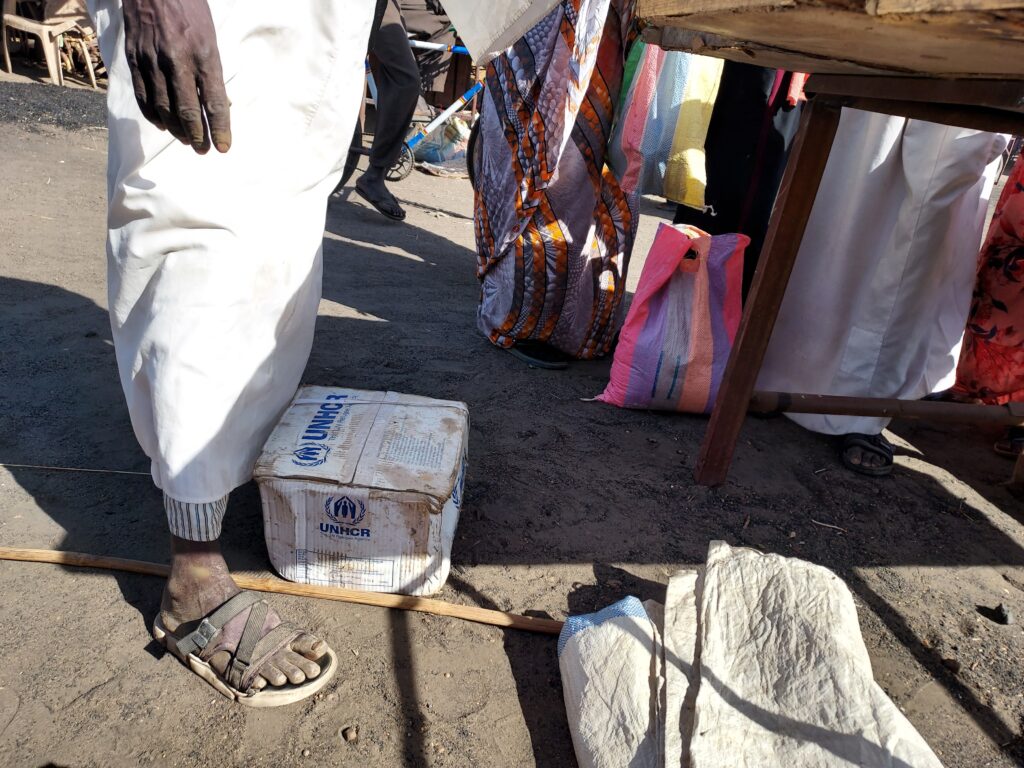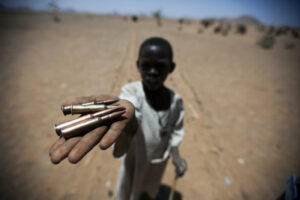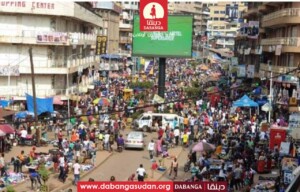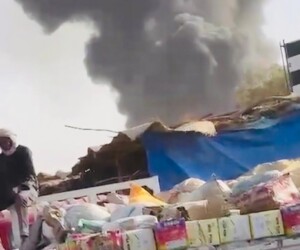Darfur lawyers to organise humanitarian conference in Jebel Marra

An UNHCR aid package sold at a market in Sudan, December 2022 (File photo: RD)
The Darfur Bar Association (DBA) is organising a preparatory forum on humanitarian issues in the Kalma camp in Nyala, capital of South Darfur, where women and children are dying from malnutrition. People living in the nearby Otash camp for displaced are also suffering from a severe scarcity of food – while aid items are being sold at markets in other parts of the country.
The DBA plans to organise a large conference in Jebel Marra in central Darfur to raise attention to the very large need of humanitarian assistance, Jamal Mousa, member of the DBA preparation committee, told Radio Dabanga yesterday.
The preparatory forum is scheduled to be held in Kalma camp in Nyala on March 25. “The food situation in the camp is so bad that many children and women are dying.”
The organisers had wanted to hold the forum in Egypt, but “we saw that the impact would be greater if it was held inside Sudan, in areas affected by the war, because in this way conveying the voice and revealing the truth and reality to the local, regional and international community.”
The international conference will take place in May, most probably in Jebel Marra “where thousands of displaced are also sheltering,” Mousa explained.
“Those outside Sudan can participate online,” he said, and pointed to the return of electricity to three of the five main power lines in Nyala on Wednesday, after maintenance work that lasted five months. The power network was largely destroyed during the between the Sudanese Armed Forces (SAF) and the Rapid Support Forces (RSF) in the city last year.
The lawyer further noted that “the conference has nothing to do with political issues. We just want to draw the attention of the international community and convince them that there is a famine ongoing in Darfur, not just a nutrition gap.”
He called on “the United Nations, the European Union and the entire international community to put pressure on the warring parties to open the way for relief and protect those responsible for aid and medical services”.
In the nearby Otash camp in Nyala, most children and elderly are also suffering from malnutrition.
“The displaced have not been able to cultivate their farms during the rainy season last year nor finding another source of income” Sheikh Abdelrazzag Hasan, head of the camp, told Radio Dabanga yesterday. “In addition, the relief provided by organisations stopped since the outbreak of war between the army and the Rapid Support Forces (RSF) in April last year.”
The sheikh said that an MSF delegation arrived at the camp last week and began preparing health centres. “Representatives from the American Alight organisation recently provided medicines, but the aid is still insufficient.”
He further lamented the insecure situation in the camp. “We also have to deal with gunmen riding on motorcycles who enter the camp from time to time, and rob shop owners and others,” he lamented. “Several displaced have quit their job in the camp’s evening markets out of fear for being shot.”
The camp head called on international organisations “to urgently intervene to save the lives of the displaced in the camps who he said are not a party to the war in the country”.
Médecins Sans Frontières (MSF) reported last month that “An estimated one child is dying every two hours” in the large Zamzam camp south of El Fasher, capital of North Darfur.
Four months ago, the UN Office for the Coordination of Humanitarian Affairs (OCHA) in Sudan already reported an ‘alarming number of malnutrition cases’ in the country.
Aid items sold on markets
Significant quantities of relief items that arrived in the country to provide relief to hundreds of thousands of war victims have found their way to the markets in North Kordofan and El Gedaref.
“Merchants did not even find it necessary to hide the logos of the donor organisations or change the packaging, some of which bear the ‘distributed for free, not to be sold’ phrase,” civil society activist Ibrahim Mousi reported from El Obeid, capital of North Kordofan. “The Saudi King Salman Centre sent relief materials including milk and tahina that are now being sold in El Obeid for the highest prices.”
He accused “those in charge of humanitarian aid in North Kordofan deal with the relief items as they wish,” and explained that “the materials are brought into the market through intermediaries between officials and merchants”.
A listener in El Gedaref in eastern Sudan also told Radio Dabanga about relief goods being sold at the markets in the city, “including flour, dates, cooking oil, and other foodstuffs”.
“If these materials were distributed among the many displaced who sought refuge in the shelter centres here, they would not need go round begging for food and their suffering would be alleviated,” he said. “They are starving despite the presence of food aid piled up in warehouses and not being distributed until it will be spoiled.”
A former UN employee, who preferred to withhold his name, told Radio Dabanga that the aid items being sold at the markets is an old problem, “as old as the relief efforts themselves, in Sudan and abroad.
“This is why foreign organisations insist on supervising the distribution of relief themselves or through local organisations they trust and according to procedures that guarantee that those in need receive them,” he said.
“These measures are often impossible to implement on the ground, especially in areas witnessing armed conflicts, as is happening in Sudan now.
“In any case, the responsibility for preserving relief materials, delivering them to those entitled to them, and preventing their leakage into the markets remains a joint responsibility between the donor organisations and the governmental bodies charged with the subject, which is the Humanitarian Aid Commission (HAC) in this case,” he added.
“National governmental and voluntary organisations often face problems in delivering relief to their beneficiaries, in addition to restrictions imposed by the government on their work. The distribution of humanitarian aid is often closely linked to political and military calculations,” the source concluded.











 and then
and then